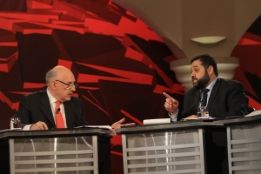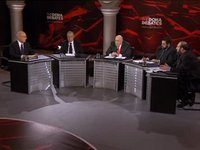Doha Debates Special Event: Hamas meets Fatah
Monday March 15 2010
MOTION REJECTED
by 11% to 89%
Details

The leaderships of the warring Fatah and Hamas Palestinian factions were dealt a resounding vote of no-confidence by fellow Arabs in a surprise ballot at a special Doha Debates event.
Out of an audience of more than 350 people, 89 per cent voted "No" to the question: "Do you have confidence in the current Palestinian leaders?" with just 11 per cent voting "yes".
Representatives of Fatah and Hamas, in growing conflict since the death of Fatah founder Yasser Arafat in 2004, were brought together in a unique public encounter at this month's Doha Debates Special event. In a lively and sometimes acrimonious series of exchanges between the two sides, it soon became clear that while representatives of the two factions argued and bickered, the Debates' audience grew increasingly united in its scepticism of their sincerity and leadership capabilities.
Fatah representatives Nabil Shaath, one of the PLO's chief negotiators, and Abdullah Abdullah, a senior Fatah spokesman, sought to blame Hamas for failing to bring reconciliation talks to a successful conclusion. Meanwhile the Hamas faction, represented by Osama Hamdan, a member of the Political Bureau, and Mohammad Nazzal, a senior spokesman, accused Fatah of succumbing to pressure from America and Egypt in negotiations.
As they argued amongst each other, one audience member after another rose to their feet to ask them, with certain variations but always to loud applause, why, after 20 years of war and violence they had patently failed to make any progress. One Palestinian student pointed out that Israel, whatever its faults, had proved a tough and resolute adversary. He asked why it had not been possible to resolve the Palestinian issue through reconciliation rather than war. Another wondered how "on earth we can hope to present a united front against the Israelis when we are so divided internally?"
The audience appeared to become increasingly frustrated by the rambling and largely incoherent nature of the responses they received.
While both sides sought to acknowledge that nothing more could be achieved in their battle with Israel until Hamas and Fatah were united under a common front, they gave few signs of understanding how that might be achieved. Both Fatah and Hamas representatives blamed "third parties" for causing much of their problems. Dr. Shaath said the civil war that "pitted brother against brother" had been caused by the West exacerbating tensions. Nazzal, speaking for Hamas, blamed "American and Israeli interference for imposing impossible conditions" on a peace agreement and "Egypt for not taking into consideration our reservations".
Hamdan, his colleague, had no sooner acknowledged that "national unity could only be achieved on the basis of partnership" with Fatah, than he found himself bound to point out that Fatah must relinquish American and Israeli pressure.
Debates' Chairman Tim Sebastian, frequently at pains to make himself heard above the squabbling, pointed out on a number of occasions that both sides, but more particularly the Hamas debating team, appeared very keen to blame everyone but themselves for any failure to reach agreement. When Nazzal told Fatah representative Dr. Abdullah that the PLO had to revise its political process and create a proper strategy, Dr. Abdullah responded by suggesting they did have a strategy and that was "to make the occupation more costly to the occupier. We must resist the occupation by all means available, even military."
Challenged by Tim Sebastian over whether he really meant that Fatah advocated a return to violence as a means to achieving its end, it was left to Dr. Shaath to suggest that it might prove impossible to fight "militarily" over the long term.
When the result of the debate vote was announced and the Fatah and Hamas representatives had taken in its full impact, a clearly stunned Dr. Shaath said: "I think the climate is very clear. We are your people. If you want better governments you have to be better people. You have to better yourself in order that you will become the government."
Watch online

